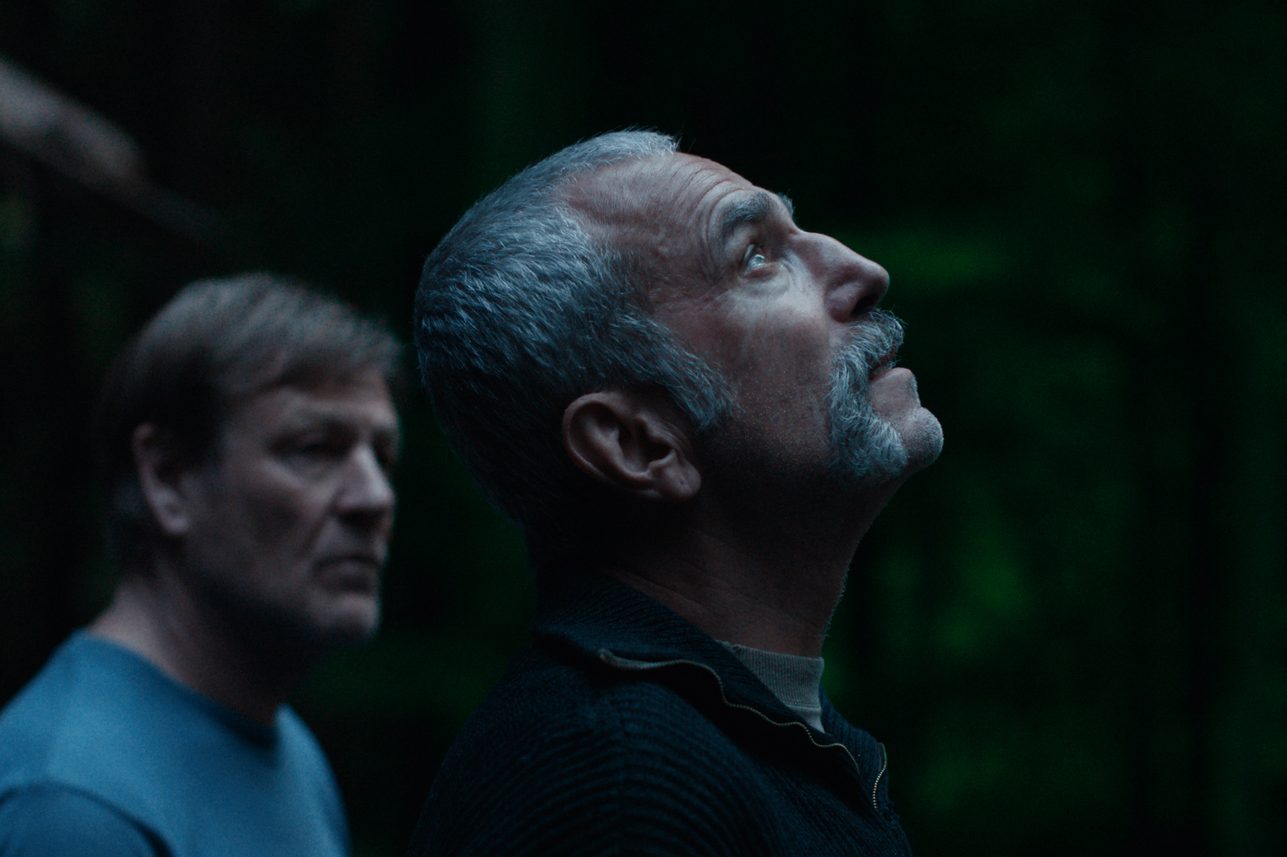When Ronan Day-Lewis said he wanted to make a film with Sean Bean because of the impression his work on Game of Thrones made upon him when he was 13, the crowd audibly gasped. For someone so young, a feature debut at The New York Film Festival is shocking; perhaps less so, though, once you learn it’s co-written by and stars his father Daniel Day-Lewis. Ronan Day-Lewis’ Anemone, though reliant on obviously-excellent performances from lauded thespians, shows slim moments of unique strength and potential from a buzzy last name’s first feature outing.
The film is an almost-chamber piece following Jem (Sean Bean), a man forced by familial circumstances to reconnect with his hermit brother Ray (Daniel Day-Lewis) who has been in self-imposed exile for twenty years. The plot is mostly built around two monologues Ray delivers, which are, of course, excellent: the first a darkly comedic recounting of Ray’s revenge on his childhood abuser, and the second an elucidation of why exactly he hasn’t seen his son, brother, or anyone, really, for decades. To say a Daniel Day-Lewis monologue is excellent, though, is like saying a fish is great at swimming; a movie can’t rely entirely on something so obviously a given.
As the film progresses, it’s slowly revealed that Ray’s trauma comes from his time in the UK’s Ministry of Defence, when he was deployed in Northern Ireland during the early Troubles. Despite being the most striking aspect of the character’s story—particularly via cutaways that show the aftermath of the brutal violence—it’s clear the plot point was a late addition to the film. It’s not the only part of the film that feels woefully underdeveloped. Characters meant to add dimension to the film feel redundant in contrast to the best moments of the film. Ray’s son, Brian (Samuel Bottomley), on the precipice of ejection from the army, is what motivates the father to return to society, who experienced the same fate during his stint in the military. Brian’s romance with pharmacology student Hattie (Safia Oakley-Green) adds some much-needed levity to a film reckoning with war crimes and child abuse. These parts, while efficacious in building out the life Ray left behind with inarguably great performances, only work to distract from Jem and Ray’s time in the woods—the inarguable center of the film.
Something like Anemone works best with intimate, unaccented cinematography; instead, the shots are overwrought and overbearing. Cinematographer Ben Fordesman’s style works well in films like Saint Maud and Love Lies Bleeding, but here it simply feels out of place. Whether we’re watching Ray hack apart sopping wet logs or Jem having a quiet conversation with his son, the camera just does not stop moving. Scenes that would benefit from stillness, like Jem sitting with his brother as he recounts a story from their childhood, are browbeaten into motion; the zoom is so subtle it makes you question why the camera has to move in the first place. This decision reads as a sense of insecurity on the part of the filmmaker—it’s as if they believe the audience wouldn’t pay attention to the subject matter itself, so flashy visuals were imperative. The few moments where the camera allows respite from endless swaying are some of the best, making it torturous when the zooming blazons its return.
Despite the underdeveloped supporting characters and bombastic camerawork, many slivers of brilliance do shine through. One particular standout moment has Ray on the beach at night, inching his way towards a glowing, spectral homunculus he somehow recognizes as his son. Bits of magical realism, along with sweeping Romantic shots of the British seaside inspired by Ronan Day-Lewis’s background as a painter, make it clear that there is a particularly unique and interesting vision behind the film buried somewhere in there.
Anemone marks Daniel Day-Lewis’s return to acting after announcing his second retirement in 2017. Having the ability to work with his son, he said during a post-screening panel at NYFF, was better than keeping his word. To have one of the best actors alive in your feature debut, especially after an almost ten-year hiatus, surely imposes a heightened sense of obligation from the filmmaker. Were it to star anyone else, Anemone would be a passable-to-impressive debut. Because of Daniel Day-Lewis, Anemone joins a pantheon of just-okay films with great Daniel Day-Lewis monologues. Perhaps the next time they work together, their collaboration will simply be a great film with great Daniel Day-Lewis monologues.

